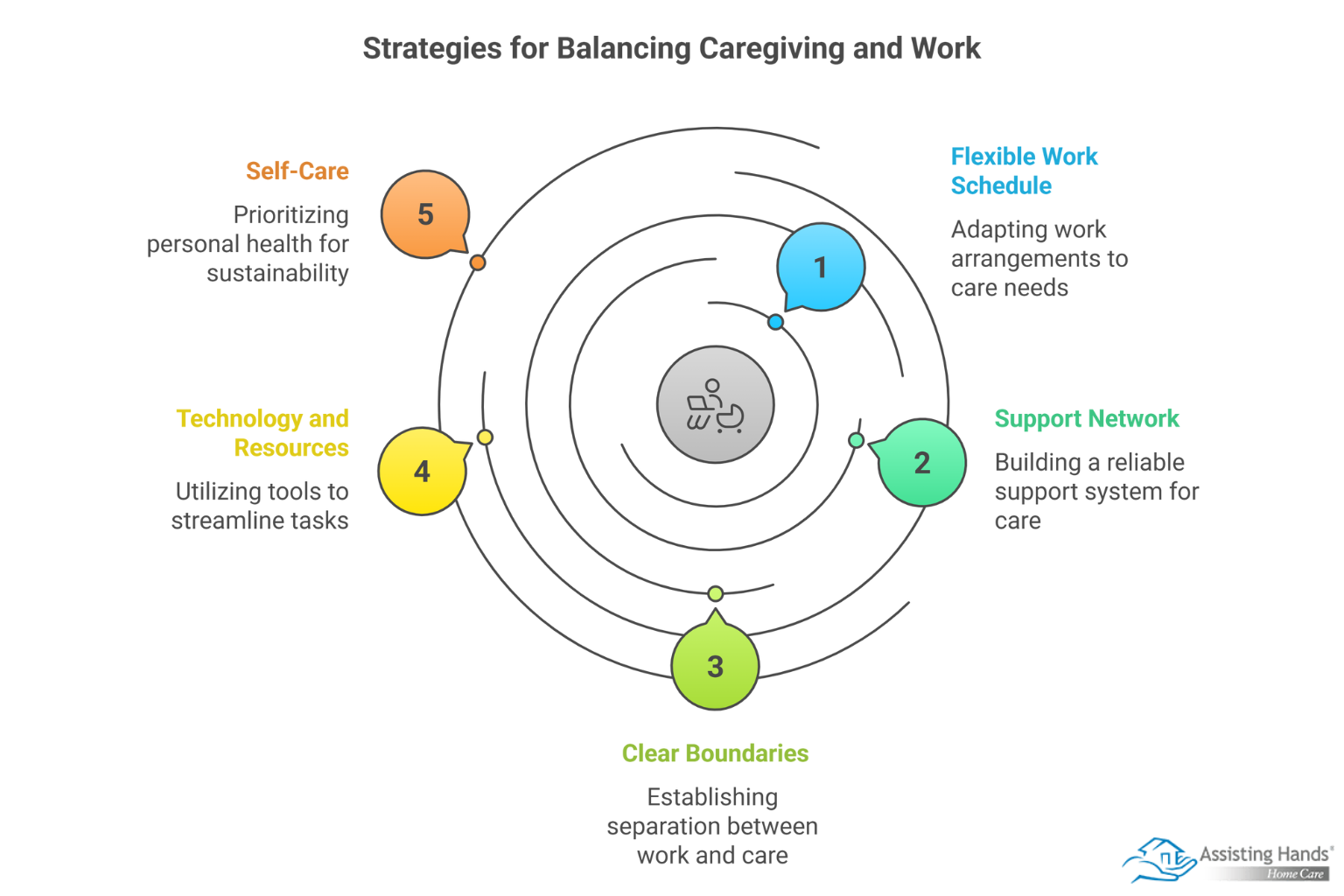
Table of Content
Juggling professional demands while caring for a senior family member can create intense pressure in every aspect of your daily life. Successfully managing both responsibilities requires strategic planning, clear boundaries, and realistic expectations about what you can accomplish.
Create a Flexible Work Schedule that Accommodates Care Needs
Establishing work arrangements that adapt to caregiving demands reduces stress and prevents constant scheduling conflicts. Many employers offer flexibility options that can significantly enhance your ability to manage both roles effectively.
Explore these work flexibility options:
- Remote work arrangements that eliminate commute time and allow closer proximity to your loved one
- Flexible start and end times that accommodate medical appointments or care transitions
- Compressed workweeks that provide full days off for intensive caregiving tasks
- Job-sharing arrangements that reduce your overall work hours while maintaining benefits
- Unpaid leave options under the Family and Medical Leave Act (FMLA)
Communicate openly with your supervisor about your caregiving responsibilities before crisis situations arise. Many managers appreciate advance notice and can help you develop solutions that work for both your role and the team. Document any agreed-upon arrangements in writing to prevent future misunderstandings.
Consider how technology can help you stay productive during work hours. Video calls, project management tools, and cloud-based document sharing allow you to contribute effectively even when working from different locations or on adjusted schedules.

Build a Reliable Support Network for Care Coverage
Depending solely on yourself for all caregiving tasks leads to burnout and makes maintaining work performance nearly impossible. Developing multiple support options creates backup plans when work demands intensify or emergencies arise.
Identify potential support team members:
- Family members who can share specific caregiving tasks or provide regular relief
- Professional in-home care providers for scheduled work hours or meetings
- Adult day programs that offer structured activities and supervision
- Trusted neighbors or friends willing to help during short-term situations
- Professional respite care services for longer work commitments or travel
Create detailed care instructions that any support person can follow. Include medication schedules, emergency contacts, daily routines, and specific behavioral strategies. Having written protocols allows others to provide consistent care while giving you confidence to focus on work responsibilities.
Build relationships with multiple care providers rather than relying on a single backup option. This redundancy protects you when primary supports become unavailable due to illness, scheduling conflicts, or other commitments.
Seniors can face a variety of age-related challenges. Though some families choose to take on the caregiving duties, there may come a time when they need a trusted home care provider. Families sometimes need respite from their duties so they can focus on their other responsibilities, and some seniors need around-the-clock assistance that their families are not able to provide. Assisting Hands Home Care is here to help.
Establish Clear Boundaries between Work and Caregiving
Without intentional boundaries, work stress and caregiving demands can overwhelm each other, reducing your effectiveness in both areas. Creating physical and mental separation helps you give appropriate attention to each responsibility.
Set specific work hours and communicate them clearly to both your employer and family members. During designated work time, minimize caregiving interruptions except for genuine emergencies. Similarly, avoid work calls or emails during focused caregiving periods unless absolutely necessary.
Designate separate physical spaces for work and caregiving activities when possible. Even small changes like using different rooms or areas can help you mentally transition between roles and maintain focus on immediate priorities.
Learn to recognize when switching between roles becomes counterproductive. Some days require accepting that either work or caregiving needs temporary priority, and trying to excel at both simultaneously may compromise both responsibilities.
Utilize Technology and Resources to Streamline Tasks
Technology tools and community resources can significantly reduce the time and energy required to manage both work and caregiving responsibilities effectively.
Leverage helpful technology solutions:
- Medication reminder apps that track dosages and timing automatically
- Calendar apps that coordinate schedules among family members and care providers
- Medical alert systems that provide emergency monitoring during work hours
- Grocery delivery and meal kit services that reduce shopping and cooking time
- Telehealth appointments that eliminate transportation and waiting room time
Research community resources available in your area. Many communities offer services specifically designed to support working caregivers, including transportation programs, meal delivery, and emergency respite care options.
Consider hiring professional services for tasks that drain your limited time and energy. House cleaning, lawn care, or grocery shopping services may cost money up front but free valuable hours for higher-priority work and caregiving activities.
In Pearland, senior home care providers can benefit aging adults in a variety of ways. From cooking nutritious meals to offering timely medication reminders, the dedicated caregivers at Assisting Hands Home Care are available to help your elderly loved one 24 hours a day, 7 days a week.
Prioritize Self-Care to Maintain Long-Term Sustainability
Neglecting your own physical and emotional health ultimately compromises your ability to succeed at work and provide high-quality care. Sustainable caregiving requires protecting your own wellbeing as a nonnegotiable priority.
Maintain basic health practices even during busy periods:
- Regular sleep schedules that support both work performance and caregiving patience
- Nutritious meals and adequate hydration throughout demanding days
- Physical activity that reduces stress and maintains your energy levels
- Regular medical checkups to address your own health needs proactively
Recognize early warning signs of burnout, including persistent exhaustion, irritability, difficulty concentrating at work, or feeling overwhelmed by routine tasks. Addressing these symptoms early prevents more serious problems that could jeopardize both your career and caregiving abilities.
Connect with other working caregivers who understand the unique challenges you face. Support groups, online forums, or informal networks provide valuable emotional support and practical strategies from people managing similar situations.
Caring for senior loved ones can be rewarding, but it can also be overwhelming for family caregivers who have other responsibilities they need to focus on. For these families, the perfect solution is respite care. Pearland families rely on our caregivers whenever they need time to rest, work, run errands, and even go on vacation. Assisting Hands Home Care can be your trusted partner in caregiving for your aging loved one. Contact one of our experienced Care Managers today to learn more about our reliable in-home care services.








